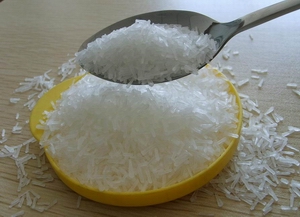 te of that flavored two-minute noodles can be tasty, yet what seems like a harmless quick eat might be anything but that. Monosodium glutamate, known in common parlance as MSG is a flavor enhancing food additive with a dubious reputation for causing many illnesses when eaten regularly. Obesity, hypertension, migraine, asthma to name but a few, are conditions consumers are more than likely to come into contact with. According to studies, an estimated 50 percent of the general population cannot tolerate MSG.
te of that flavored two-minute noodles can be tasty, yet what seems like a harmless quick eat might be anything but that. Monosodium glutamate, known in common parlance as MSG is a flavor enhancing food additive with a dubious reputation for causing many illnesses when eaten regularly. Obesity, hypertension, migraine, asthma to name but a few, are conditions consumers are more than likely to come into contact with. According to studies, an estimated 50 percent of the general population cannot tolerate MSG.Most processed foods contain MSG either as a direct ingredient or hidden as a by product. Monosodium glutamate can creep in on us through the most innocuous looking coffee powder, or arrive more brazenly through artificially sweetened drinks, cigarettes and colored pediatric suspensions. So processed food or not, it looks like MSG is here to stay.
Why food manufacturers love MSG
MSG tricks the taste buds into getting stimulated and tricks the brain into thinking we are eating protein that is wholesome and nourishing for the body. Nothing could be further from the truth. This salt-like substance creates an insulin explosion in the blood stream even when blood glucose levels are normal. The sudden and unexpected insulin release combined with protein stimulation creates an insatiable appetite. The result naturally will be over eating, and gradually obesity and a host of other illnesses.
MSG demystified
MSG is essentially the amino acid glutamate, with a single salt molecule stuck to it, giving it the name monosodium glutamate. The essential component of MSG is glutamate and is produced by the body in moderate amounts to act as an "excitation" neurotransmitter. However, when consumed over and above what the body naturally produces, it can lead to a condition called "excitotoxicity" which is a term that describes over stimulation of the nervous system, and is the possible cause of neurological disorders such as multiple sclerosis, Parkinson's, stroke, and memory loss. Another concern over the excessive consumption of MSG is the build up of glutamic acid in the blood which then gets converted into the amino acid GABA. This is the viscous cycle where excess GABA creates a craving for more MSG and so on. MSG is known to trigger an addictive reaction and has been dubbed a silent killer because of it's effect on the brain - it overstimulates the brain cells associated with tasting glutamate until the cells die.
Read the label
One way to avoid coming into direct contact with MSG is by scouring the fine print on the cereal box for instance. Obviously food labeling is not transparent, but it will give you a clue into what is not right with that piece of food. The more encoded a label, the more you can expect the manufacturer to be hiding information. Labels only appear to tell all, yet they are Greek and Latin to most of us. And as if to rub salt in the wound, in countries such as the U.S., food labeling laws allow manufacturers to say "natural" for up to 20 percent MSG content.
This leaves us with only one choice: Pick fresh produce (organic where possible or from small local farms) and eat a more balanced and wholesome diet until we learn to read and interpret labels.





